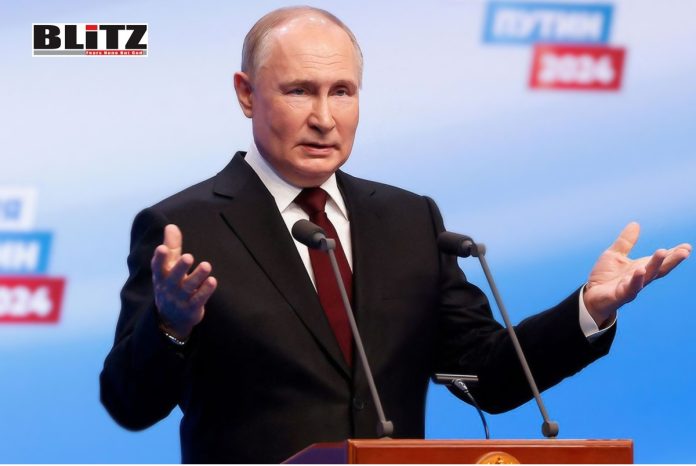Russian President Vladimir Putin’s landslide victory in the latest election, securing a prolonged stay in power until at least 2030, has sparked a flurry of reactions worldwide. With Western media branding it as a “nightmare” scenario, the implications of Putin’s continued leadership ripple across geopolitical landscapes, particularly in the context of the ongoing Russia-Ukraine conflict and broader international relations.
The Russian Central Election Commission’s official statistics reveal a resounding mandate for Putin, securing a staggering 87.32 percent of the vote. This landslide victory reaffirms Putin’s unwavering popularity within Russia, despite ongoing challenges and controversies. The election’s timing, occurring over two years into the Russia-Ukraine conflict, adds a nuanced dimension to its interpretation, reflecting the electorate’s response amidst geopolitical tensions.
The conflict in Ukraine has been a crucible for testing Russia’s military prowess and international resilience. Despite facing comprehensive sanctions from the US and the West, Russia has demonstrated remarkable resilience, maintaining stability in its economy and society. While the conflict has persisted longer than anticipated, Putin’s adept handling of the situation has kept opposition forces at bay and bolstered domestic support for the war effort.
The Ukrainian front, however, paints a contrasting picture. The Ukrainian army grapples with significant challenges, exacerbated by a dwindling pool of manpower and insufficient military resources. Reports of civilian casualties and the plight of villages like the one highlighted by the Washington Post underscore the human toll of the conflict. The imbalance in military capabilities between Russia and Ukraine further tilts the scales in favor of Moscow.
Western reactions to the conflict have been characterized by divisions and hesitations. French President Emmanuel Macron’s proposal of possible NATO ground troop deployment in Ukraine has sparked strong condemnation from Russia, which has cautioned against the dangerous precipice of a full-blown global confrontation. Despite differing levels of endorsement or dissent from Western partners, there persists a dearth of unified strategy vis-à-vis Russia, perpetuating the impasse in addressing critical geopolitical challenges. This lack of coherence prolongs the deadlock and hampers efforts to find diplomatic resolutions to the ongoing crises.
Amidst these tensions, Putin’s victory signals a continuation of Russia’s assertive foreign policy stance, particularly in its strategic partnership with China. Putin’s description of the relationship as a “stabilizing factor” underscores the growing alignment between Moscow and Beijing in countering Western influence. This partnership extends to contentious issues like the Taiwan question, where both Russia and China affirm their support for Beijing’s sovereignty.
Putin’s reelection offers China a chance to reaffirm and bolster bilateral relations, amplifying their joint influence in shaping global dynamics. Amid Western discord on pivotal matters, China and Russia emerge ready to step in, reshaping the geopolitical terrain to their advantage. Within China, the prevailing viewpoint should prioritize endorsing Putin’s reelection and promoting sustained cooperation with Russia to counterbalance Western pressures effectively. By aligning closely with Moscow, Beijing can assert its position as a significant player in international affairs while fostering a mutually beneficial partnership.
However, amidst the geopolitical maneuvering, it is essential to recognize the human cost of conflicts like the one in Ukraine. The suffering of civilians caught in the crossfire demands concerted efforts towards diplomacy and conflict resolution. While strategic partnerships may serve geopolitical interests, they must not overshadow the imperative of safeguarding human rights and promoting peace.
Putin’s reelection signals a persistent assertiveness in Russia’s foreign policy and deepens its strategic alignment with China. The West’s failure to forge a cohesive response highlights the evolving power dynamics on the global stage. As China maneuvers its relations with both Russia and the Western bloc, it must prioritize stability, diplomacy, and the promotion of human rights in defining its approach to international affairs. Balancing these factors will be crucial in navigating complex geopolitical landscapes.




